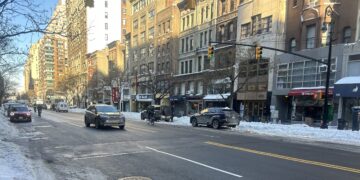
By Scott Etkin
Who knew that when Riverside Park opened a new composting facility last year, located at West 95th Street adjacent to the West Side Highway, it would lead to a local law requiring similar facilities to be built in parks across New York City?
But that’s what has happened: A bill introduced by Upper West Side Council Member Gale Brewer will bring about an increasing number of composting facilities in New York City parks over the next four years. It was inspired by Riverside Park’s Compost Compound, which processes “woody debris, leaves, greens, and invasive [plants]” from parks across northwestern Manhattan into compost, which is then incorporated back into the park, according to the Riverside Park Conservancy’s website. For example, fallen leaves collected from the park are used as an ingredient in the compost or turned into leaf mold to be used as a soil cover.
“We saw Riverside Park [composting organic material] on their own, and we wanted to replicate the good stuff that they’re doing,” Sam Goldsmith, a representative of Brewer’s office said on a call with the Rag.
The bill – which the City Council passed unanimously, with 50 votes in favor, and has sent to the Mayor for his signature – mandates that by July 2026, there must be at least one compost facility within two parks in each borough. By 2027, three parks in each borough must have composting facilities, and by 2028 that increases to five parks in each borough.
The law also requires the city’s Parks Department to report annually on its progress toward these goals, including metrics on each facility’s composting process, such as the “total amont of plant waste managed” and the “annual cost of operating” each facility.
So far, the Riverside Park facility has prevented over 2,000 cubic yards of horticultural waste from entering landfills, where it decomposes into methane, a harmful greenhouse gas. It has also created 80 cubic yards of finished compost for use in the Park’s garden beds and landscapes, the Riverside Park Conservancy wrote in a message to the Rag.
In her remarks to the City Council, Brewer said her bill would not only reduce waste sent to landfills, but would also “improve soil health, and decrease greenhouse gas emissions – and it will create green jobs, since staff will be needed to operate the sites,” she said. If parks create their own compost and useful organic materials like wood chips, it also eliminates or offsets the need purchase them from outside.
“We are so proud to be part of making NYC compost history!” the Riverside Park Conservancy posted on Threads following the passage of the resolution.
Riverside Park isn’t the only Upper West Side park to have a composting site. The Mount in Central Park at East 104th Street is actively used for composting, a representative from the Central Park Conservancy confirmed to the Rag. It is closed to the public, according to the conservancy’s website.

Riverside Park’s Compost Compound was funded by a private donor but it’s not clear where the funding for the additional facilities in other parks will come from. (The Central Park Conservancy and Riverside Park Conservancy are the two nonprofits affiliated with the operations and maintenance of the Upper West Side’s two largest parks.)
As a candidate, Eric Adams pledged to dedicate 1% of the city’s budget to parks but has not done so as Mayor. The most recent budget allocated to Parks “$20 million less funding than last year even as the city budget grew by $5 billion,” THE CITY reported. “The $618 million for Parks in a $112.4 billion budget comes to 0.55%, the lowest share of funding set forth in an adopted budget in a decade.”
The NYC Parks Department had “a loss of 800 positions in the last year alone,” the Riverside Park Conservancy wrote in a message to the Rag. “We know firsthand that the daily maintenance of a compost facility requires a financial commitment.”
Conversations about funding were part of the formation of the bill, but ultimately did not enter into its language. “[We] totally agree that resources are needed, but the administration has indicated that they’re committed to this,” said Goldsmith
Subscribe to West Side Rag’s FREE email newsletter here. And you can Support the Rag here.










Why are invasives included in the composting ?
Good question. If the compost is properly “cooked” (part of the process that turns organic waste into compost), the seeds of invasive plants like Japanese knotweed are sterilized and rendered harmless. We can only hope that the Compost Compound isn’t short-cutting the process.
This is a step in the right direction , non GMO compost only…ty I love this because we need to enrich turn and compost to help make new again!! Yayyyy..I want to see the process plan. And start planting non GMO fruits in the parks and take care of the honeybees, stop cutting food out of the cities ..ty I’m so proud of you…
Why are invasives included? Seeds and roots from Japanese Knotweed and Mugwort for only two examples are very hardy and would be spread all over using compost made from them.